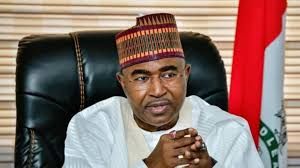Brigadier General Buba Marwa (retd.), the Chairman of the National Drug Law Enforcement Agency (NDLEA), shared a startling personal experience regarding substance abuse in aviation during the third edition of The Conversation Conference in Abuja, which coincided with World Mental Health Day. Marwa recounted the challenging decision he had to make when he terminated the employment of a pilot from his now-defunct airline, Albarka Air, after discovering the pilot tested positive for drugs. Marwa founded the airline following his departure as the military administrator of Lagos State, but he resigned as CEO in 2003, and the Federal Government controversially revoked its licenses in 2007. His story highlights the critical responsibility of ensuring safety in air travel and the broader implications of substance abuse within professional environments.
Marwa’s decision to dismiss the pilot stemmed from a specific incident that caused alarm among passengers. During a flight from Lagos to Maiduguri, the captain, under the influence of drugs, announced unsettling news that led to widespread panic among the passengers, even resulting in some fainting. After receiving several complaints from passengers, Marwa conducted an investigation which confirmed the alarming situation. His swift action to replace the compromised pilot with a sober alternative underscores the importance of vigilance and integrity, especially in roles where public safety is paramount. Following the experience, he implemented random drug tests for pilots and crew members, advocating strongly for a drug integrity testing policy within workplaces.
The issue of substance abuse is particularly pertinent in Nigeria, where youth are notably affected. Ayodele Olawande, the Minister of State for Youth Development, addressed the challenges faced by Nigerian youth struggling with addiction and highlighted the absence of adequate support systems for recovery. He revealed that his ministry is escalating efforts to raise awareness about mental health and substance abuse. Olawande emphasized the importance of addressing the mental health crisis within the country, acknowledging the systemic issues that contribute to the neglect of mental well-being. He expressed optimism regarding new initiatives that would be announced, aimed at tackling the mental health challenges plaguing the youth.
In addition to the insights provided by Marwa and Olawande, Vincent Udenze, the event host, highlighted the widespread misunderstanding of mental health issues, particularly in workplace environments. He noted that many individuals attribute their mental health struggles to physical ailments like malaria, often overlooking the mental distress or burnout they experience. Udenze pointed out that the socioeconomic conditions in Nigeria exacerbate the mental health crisis, with employees dealing with hunger and stress yet failing to disclose their struggles due to stigma or lack of understanding. This calls for a cultural shift in the workplace, where employers should actively engage with their employees regarding their mental well-being.
Udenze’s comments resonate with the notion that mental health should be prioritized as much as physical health in professional settings. He urged employers to foster a compassionate environment where employees feel valued and supported, including simple gestures like checking in on their welfare. By promoting conversations around mental health, organizations can mitigate issues of burnout and distress among their workforce, thereby enhancing productivity and employee satisfaction.
Overall, the discussions at The Conversation Conference illuminate the multifaceted struggles related to mental health and substance abuse in Nigeria. The testimonies shared by Marwa, Olawande, and Udenze highlight the urgent need for systemic change, awareness campaigns, and supportive measures for those suffering from addiction and mental health challenges. Raising public awareness, coupled with strong enforcement against substance abuse, could potentially alleviate the burden faced by many Nigerians, particularly the youth, providing them with the support necessary for recovery and resilience against mental health issues. This collaborative approach can pave the way for a healthier society where individuals are better equipped to confront their challenges and thrive.














